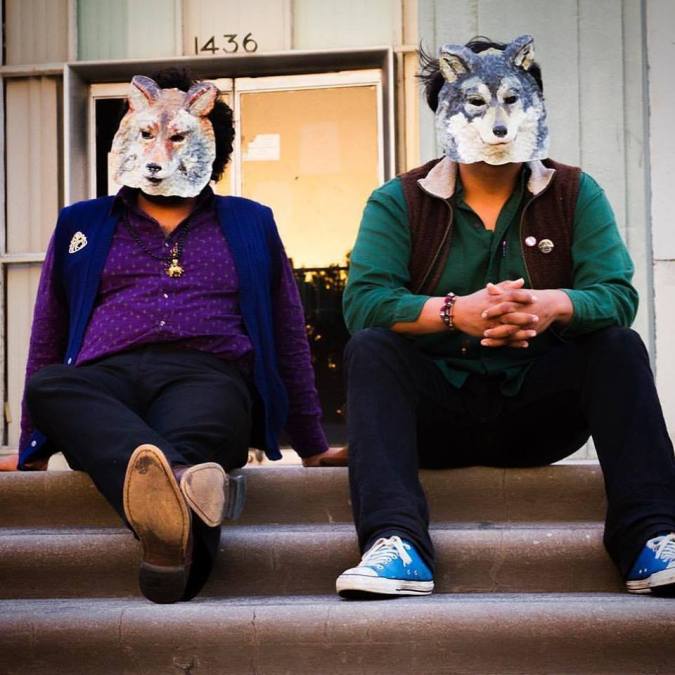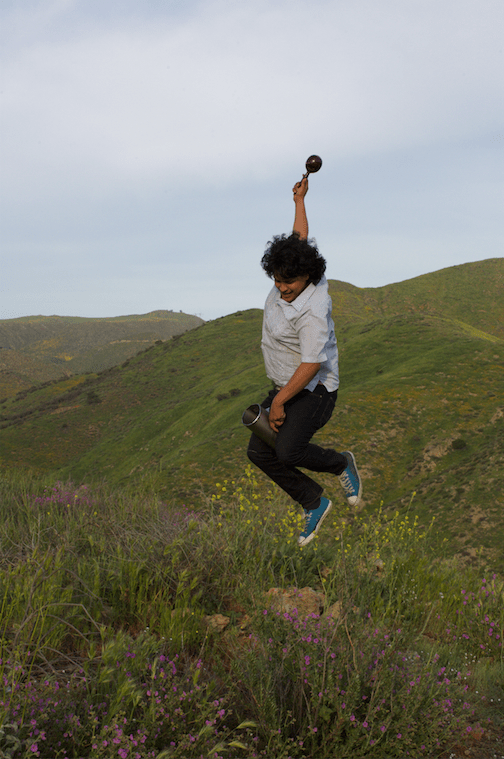Los Angeles trio Thee Commons is often described as a psychedelic punk cumbia band, but that’s shorthand at best. Listening to them, you hear a lot of things. You hear Spanish and some English. You hear the metallic buzz and reverb of surf guitar, the heavy bounce of cumbia, a bit of son jarocho, a lot of garagey punk attitude, and maybe even a little ska. What ties it all together is the psychedelic vibras that owe as much to Peruvian chicha as to L.A. psych pioneers like Love. It’s hard to say if the mix of sounds on their newly released third full-length Paleta Sonora draws more on Latin American or North American influences, but it is definitely potent, and it could not have come from anywhere other than the City of Angels.
Singer and guitarist David Pacheco points out that the “paleta” in the album’s title could have different meanings. “It could be like your taste buds or like an artist’s palette,” he drawls (The reference to the frozen treat is a given). Over the phone, his voice has a hint of the gravelly rasp that makes his vocals so distinctive. On stage, at full volume, it blossoms into a sustained guttural fry that’s a little bit Erwin Flores of Los Saicos and a little Sam the Sham of Sam the Sham & the Pharoahs. Thee Commons are drawing on a lot of rich source material, and combining it all with skill and discernment. He pitches the LP as “a sweet musical journey” through the band’s many modes. As self-assessments go, that’s pretty spot on.

The band, which consists of Pacheco, his younger brother René on drums, and bassist José Rojas, perfected their proprietary blend over countless hours practicing in the garage of the house in East L.A. shared by the two brothers. After 9 p.m., they turn their amps way down so as not to disturb their neighbors. Pacheco says this courteous move had the unanticipated effect of helping them refine their sound, explaining that “It was a nice challenge for us to say, ‘OK, we’re going to play this song and it goes really fast, but we’re going to master it at a very low volume and keep the energy in there.’ Later, when we recorded it, it was a piece of cake to play it at regular volume.” Live, they are plenty loud, and their shows are famously wild affairs, so the quiet-time rehearsals gave them the opportunity to hear their music differently, offering the necessary perspective to smooth over transitions and connect the dots between genres. The finished product can feel like a mind-expanding drive through time, space, and Los Angeles.
Their voluntary noise curfew is thoughtful, but East Los Angeles is full of music of all kinds at all hours, and has been for a long time. Pacheco can hear the Garfield High School marching band practicing for hours starting at dawn each fall, and there’s a raucous birthday party at least every other weekend. He’ll own that the environment has had an influence on him: The piano riff on the band’s song “Milk and Honey” was inspired by the neighborhood’s ice cream truck. The area has also become known for its backyard punk scene, as well as bands like Chicano Batman, who are carrying on a well-established tradition of Chicano rock, from Thee Midniters in the 60s to Los Lobos. “The neighbors said [Chicano reggae band] Quinto Sol used to practice around here too,” Pacheco offers. Closing a circle of sorts, Thee Commons have opened for Thee Midniters, from whom they have borrowed the “thee” in their name.
The Pacheco brothers were born and raised in East L.A., but mom and dad came to Los Angeles from Puebla, Mexico in the early 80s. David and René grew up on their parents’ records: rancheras, cumbias, and norteños. When Pacheco heard the Roots of Chicha compilation put out by Barbés Records, the sound of Peru’s psychedelic cumbia riveted his attention and eventually transformed the style of the band. “That rhythm and those melodies reminded me of a lot of music that my dad would play. What was unique about Roots of Chicha was they would have the guitar as the lead instrument. Most cumbia focuses on accordion or keyboards. To me, it was cool that you could have a guitar make you dance that way,” he recalls. He shared the CD with his father, which opened a floodgate of intergenerational music recommendations the guitarist was only too happy to absorb and incorporate into the sound of his band. These days, Thee Commons are known to cover Juaneco y Su Combo right alongside Selena and Nirvana.

The trio started out in 2012, playing in backyards and at benefits for community organizations in East L.A. before moving on to a daring series of guerrilla shows outside of other concerts, using the ingenious pairing of a rechargeable car battery and a power converter to plug in. “The responses were pretty mixed at first,” Pacheco admits. They haven’t done this in a long time, but he still chuckles when he talks about it, and it did help them to get noticed. Now their garage-honed jams bounce off the walls of clubs like The Echoplex and the storied Roxy. Local press hails them as one of the best live bands in the city. This year, they played Coachella, an experience Pacheco describes as “surreal as fuck.”
To celebrate the release of Paleta Sonora, the band played a free show at Levitt Pavilion in McArthur Park last week. The elder Pacheco was in effect. He’s grown more supportive of the band as they’ve leaned into their cumbia side and started enjoying some undeniable success, but he really got a kick out of the album release show. His son explains: “When he first came from Mexico, he used to live in some of the apartments around the park. In the 80s, even in the 90s, that park was terrible, gang-infested, and dirty. He was reminsicing because, 20 years later, we’re on that stage now and it’s all renovated and it looks nice.” Turns out the mix Thee Commons are bringing to the scene is a crazy trip, even for dad.
Paleta Sonora is out now on Cósmica Records.




